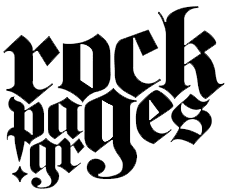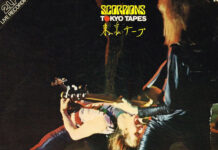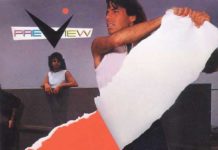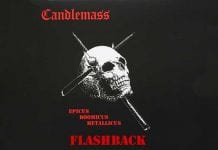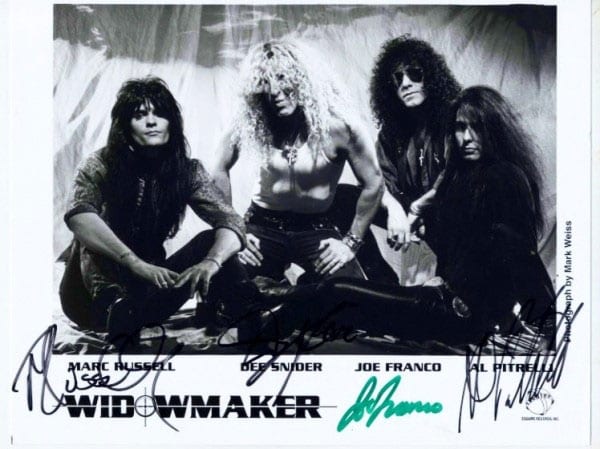
Everybody knows Dee Snider. I am sure that everyone has heard at some point in their lives the timeless hits “I Wanna Rock” and “We’re Not Gonna Take It”. But the thing that most people didn’t know –at least up until the arrival of the internet- was the fact that Dee Snider attempted to recapture the glory of his Twisted Sister days with two bands: Desperado and Widowmaker. Eventually, those two outfits didn’t achieve their goal and unfortunately disbanded after a while. The good thing is that in the meantime they managed to produce three excellent records (although the Desperado material remained shelved for years) and it’s not scarce to meet fans claiming that the debut Widowmaker album is as good as the classic Twisted Sister records. In addition, Dee Snider always stated that the songs that he had written during his Desperado days are some of the best of his entire career.
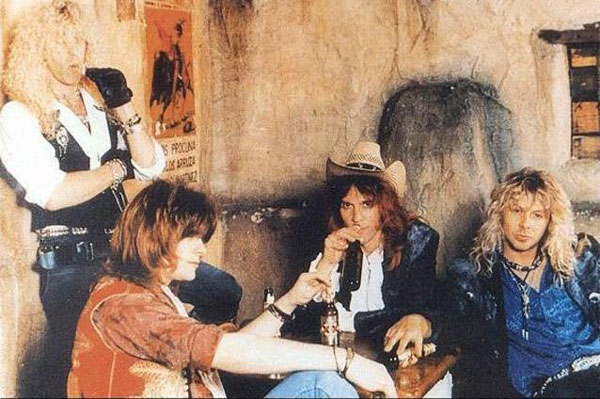
In order to shed some light in those relatively unheralded years, Rockpages get in touch with Desperado’s guitarist and main songwriter Bernie Torme, the bassist of both bands Marc Russell and Freddy Villano who filled in the bass slot when Russell left Widowmaker. So, there you go…needless, to say that it’s never too late to get to know a little more about those truly exceptional bands. Enjoy!
Sakis Nikas
BERNIE TORME
Rockpages.gr: How did the collaboration with Dee Snider come up?
Bernie Torme: My band Torme had fallen apart because Phil Lewis had left to join LA Guns: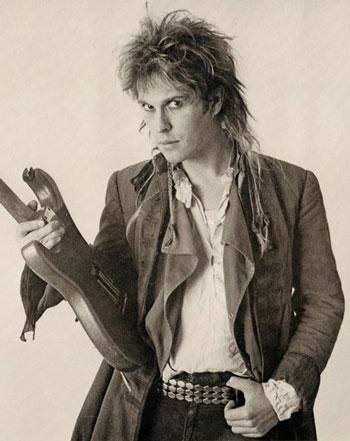 I had tried to carry on with a changed line up, Gary Owen on vocal, Marc Russell on bass and a drummer called Ben Bennett, but it wasn’t really working too well, we couldn’t get enough gigs and never really found our feet, all good players but it never developed its own identity. I wasn’t in a good place at that point in time, I just wanted a change. At that point I had a phone call from Mark Puma, Dee’s manager, asking if I would be interested in working with Dee, they were looking for a guitar player. They had approached a guitarist called Mark Keen from a band called The Grip. Mark Keen had also worked with Mammoth, and had sent Mark Puma a cassette of his own stuff with the Mammoth album on the B side: Mark Puma and Dee did not like Mark Keen’s own stuff so much, but they loved the lead guitar on the Mammoth album, and asked him if it was him: he told them ‘no, its Bernie Torme’. Sadly Mark Keen, who was a great guitar player, was killed in a motorcycle accident in the 90’s.
I had tried to carry on with a changed line up, Gary Owen on vocal, Marc Russell on bass and a drummer called Ben Bennett, but it wasn’t really working too well, we couldn’t get enough gigs and never really found our feet, all good players but it never developed its own identity. I wasn’t in a good place at that point in time, I just wanted a change. At that point I had a phone call from Mark Puma, Dee’s manager, asking if I would be interested in working with Dee, they were looking for a guitar player. They had approached a guitarist called Mark Keen from a band called The Grip. Mark Keen had also worked with Mammoth, and had sent Mark Puma a cassette of his own stuff with the Mammoth album on the B side: Mark Puma and Dee did not like Mark Keen’s own stuff so much, but they loved the lead guitar on the Mammoth album, and asked him if it was him: he told them ‘no, its Bernie Torme’. Sadly Mark Keen, who was a great guitar player, was killed in a motorcycle accident in the 90’s.
Anyway Puma tracked me down and called me, I said I’d love to do it, and then Dee called me and shouted at me down the phone for hours! Typical Dee, loved it, he’s a force of nature! They had been looking for a guitar player/foil to set Dee off against, like Mick and Keith or Joe Perry and Steven Tyler, and that really appealed to me. So I went to New York and Dee and I got on like a house on fire, we bonded, it was good.
Rockpages.gr: Were you aware of his career with Twisted Sister?
Bernie Torme: Yes definitely, but more the UK end of it, I knew lots of people who had seen their debut at the Marquee and raved about them, I loved ‘I Am I’m Me’ and saw them on The Tube, which was a big live rock TV show at the time in the UK, where they fucking destroyed, they were awesome. I wasn’t a big fan of a lot of the records after that, they were a bit too poppy for me, but Dee was always mindblowing, Mendoza too, and that early Under The Blade stuff was killer.
Rockpages.gr: Desperado attempted a blues based hard rock sound influenced by an overall Spaghetti Western image. Whose idea was it and how did it fit with the general climate of the 80s?
Bernie Torme: The image was Dee’s: he had seen this band called The Unforgiven and he had really liked their image.
{tcg_youtube|view=GAxxR828uUg}
So he wanted to do this civil war cowboy image thing: I just wanted it to be really scruffy and rock n roll! But the cowboy thing wasn’t all that different to what had been going on in London in the mid 80’s, I had the Cuban heel boots and the long drape jackets and cowboy ties and stuff, but I really did not want to go too far in that direction, being from Dublin and not that familiar with the streets of Laredo! Dee was hugely into image, and having a complete band image, as Twisted had, whereas I was always more loose Stonesy European rock n roll: I always worked on my image but I never gave a fuck for anyone else in the band’s image, that was up to them! Gillan had been like that. But Dee being Dee, and it was his band and his idea, wanted to go in that ‘group image’ direction, and any direction Dee wants to go in he likes to go maybe a bit too far! I was not always too keen on that, so I suppose I was a bit of a wet blanket at times, I was more interested in it being cool and credible rather than being a pretend cowboy! I thought the image was maybe a bit limiting, as Twisted’s had eventually turned out to be.
The sound of the band was probably more to do with me than the image was. Clive, Marc and I played the way we played, that was just how we sounded, and Dee generally did not really get involved in making changes, though he did occasionally, I suppose generally he liked it the way it sounded. Both Clive and I were very identifiable players in sound and style, and Marc Russell glued us together brilliantly. Initially Dee wanted a keyboard player, but that never happened.
It did initially fit in with the image of the mid 80’s US scene, Cinderella and Bon Jovi, Jake E’s Badlands and people like that, but it all took far too fucking long, by the time the album was recorded and scheduled for release the market had changed and that type of thing was kind of old news and fairly passé and maybe even a bit cheesy, dare I say it.
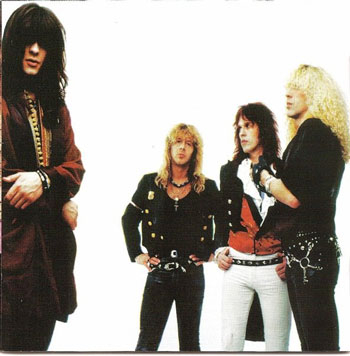 While I thought the music was great (I would, I wrote a lot of it!), it worried me how Dee’s awesome onstage persona, which he is the best person on the planet at, the ‘you fucking muthafuckas’ thing, abusing the audience, would work in the context of songs about cowboys and horses and colt 45s! I still can’t see that, and I don’t think that part of it would have worked half as well as Twisted did live. I think in retrospect that was a bit of a fault line.
While I thought the music was great (I would, I wrote a lot of it!), it worried me how Dee’s awesome onstage persona, which he is the best person on the planet at, the ‘you fucking muthafuckas’ thing, abusing the audience, would work in the context of songs about cowboys and horses and colt 45s! I still can’t see that, and I don’t think that part of it would have worked half as well as Twisted did live. I think in retrospect that was a bit of a fault line.
Rockpages.gr: Despite the fact that you signed a contract with a big label (Elektra), the album got shelved and the fans had to wait lots of years in order to listen to it. Why do you think the album was never officially released by Elektra and most importantly why they didn’t let anyone buy the rights for it?
Bernie Torme: The whole contractual situation was between Dee and Mark Puma and Elektra, I had nothing to do with that. I was supposed to sign a mirror contract, but that still hadn’t happened when Elektra dropped Dee. Getting the deal and recording the album took far too long. It never should have been Elektra in the first place, it should have been Atlantic, which was Twisted’s label, and the label that the project started out on. So it initially was Atlantic, but there was a lot of politics going on, and Dee and Mark Puma sort of wanted to teach Atlantic a lesson, so instead of continuing with Atlantic they switched to Elektra, who were also offering slightly more: Elektra was a serious mistake, I personally think Dee was very badly advised. The guy who signed it to Electra, Brian Koppelman, left Elektra in the middle of the recording. So there we were stuck with a record company who had spent a huge amount of dollars on us where the only guy who really wanted us had left. Dee’s management’s relationship to Elektra as time went on was not good, and Elektra (despite the fact they had Metallica and Motley Crue) were not a rock label, they were more acoustic, niche and left field: they had little interest in rock, and let it be known to us that both Metallica and Crue were just cash cows in their opinion, and they would drop them if they could. Remember this was the crazy ‘80’s when record company people were more cocaine psychopaths than the bands were. Following the completion of the album there was a disagreement over what was going to be the first single. Dee wanted ‘No Angels Here’, Elektra wanted ‘Gone Bad’.
Elektra had paid 450,000 dollars for the album, which gives you some right to an opinion. I can’t remember who had contractual final say, probably Elektra. I also did not agree with Dee, I personally felt ‘Gone Bad’ was the more instant radio play track, but Dee was adamant, he wanted ‘No Angels’ and it was his band, his contract, and ultimately his album: I only co-wrote and played guitar: if my opinion was not taken, I had no problem about that, since it was Dee’s band, I accepted that, he was the guy out in front. Just before they dropped us and shelved the album I had a call from the A&R who had taken over Desperado from the guy who had signed it, begging me to talk to Dee to get him to change his mind, they seemed to be under the mistaken impression that Dee might actually listen to me and change his mind! They didn’t know Dee like I did, he had made his mind up, no changing it! I told the guy that I would call Dee and try and talk him round, but that I really did not think he would listen. It was a funny experience to have graduated from being the resident crazy man in Gillan to being the reasonable one in Desperado!
I called Dee and really tried to talk him round, but there was no way, he felt it had to be ‘No Angels’. While I didn’t feel it was the best choice, I had no problem with it, it was up to him. A couple of days later Elektra dropped Desperado. In my opinion they were using that as an excuse to drop the band, it was really not that important an issue. They really dropped all of us instantly into the abyss, no money, no jobs, Dee eventually lost his house, it was not a good experience for any of us. I feel we were completely fucked by a childishly dictatorial unreasonable record company, by Dee being very badly advised, and the whole project being handled really poorly by his management. A little bit of transparency and truth from both Elektra and Dee’s manager spelled out to the band as a band would have helped a lot. There were no other players other than Dee and his management on one side and Elektra on the other in that particular game of poker, me Clive and Marc were not involved, and would have got on with it whichever way the dice rolled. There wasn’t much reality present.
I loved that band and everyone in it, all my brothers, but it was crazy crazy stuff, and honestly still quite difficult to talk about. Elektra acted like the school yard bully, just trying to prove a ridiculously short sighted point by throwing their most expensive new toy out of the pram and destroying it, because it didn’t do exactly what they wanted: they could have made their point by sticking out the track Dee wanted and not promoting it and letting it die, record companies have been doing that since time immemorial. They then could have released ‘Gone Bad’ and promoted the ass off it to prove that they were right. They could have released both as a double ‘A’ side and ignored ‘No Angels’. But no, they acted like childish primadonnas and broke the whole thing: Dee was entitled to act like a primadonna, he was one! He was a fucking star! That’s what he did for a living, that’s what made him great onstage and great as a performer in general. They were grey business nonentities, who were supposed to be reasonable rational industry people, but actually Elektra acted like the biggest ego-wielding primadonnas of the lot. Those music industry people deserved Napster and the destruction of the music industry that happened 10 years later, they were short sighted, egotistical to a ridiculous degree, untalented, narrow minded and basically morons. I swore I would never get involved with a major label again after that experience: their little gesture meant we couldn’t pay our rents or our mortgages, Dee lost his house and struggled to keep his family together, just insanity.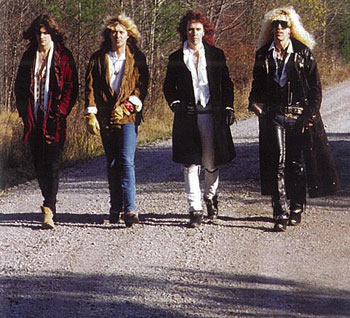
Following that Elektra were still very pissed off with the band and wanted their money back, all $450,000 of it. At this stage it had got very personal between Elektra and Dee and his management. Dee and the management had already burnt their bridges with his old label Atlantic, so there was no help there. I understand Michael Faley at Metal Blade tried very hard to sign it, but it never happened. I don’t think Metal Blade had enough money at that stage, they weren’t that kind of label, and it was a ridiculous amount of money to begin. No one wanted to buy Elektra out at the price they were asking. The attitude was ‘if it was worth all that, why doesn’t Elektra put it out’? It was a no win situation.
I’ve heard stories about Desperado being dropped because of the Grunge explosion, but I don’t believe a word of that, it just sounds like someone’s explanation in retrospect, not why it actually happened.
Rockpages.gr: You wrote with Dee tons of songs for the Desperado album. Some of them ended up on the Widowmaker albums but also Dee Snider’s solo album. How was the experience of working with Dee especially considering the fact that Dee had always written his own songs without any outside collaboration?
Bernie Torme: Initially a bit weird, Dee felt that he didn’t need me, I felt he did! I think he came round to seeing my point of view quite quickly though and appreciated my input. Dee wasn’t a musician, and really regarded songs as just melody and lyric: but that is not the way rock, rock n roll or blues works. Whole Lotta Love without the guitar riff? Jumping Jack Flash without the riff? You can write songs without accompanying grooves or music or harmonic changes, but they are not rock songs. It was a sore subject because of his past in Twisted, but he came round to it working well. It was a good writing partnership, he’s a very talented writer, we worked well together.
Rockpages.gr: What do you remember from the recording sessions for the Desperado album? It took many months to complete it…right?
Bernie Torme: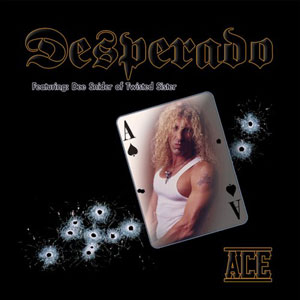 Some laughs but mostly boredom to be honest. Both Clive and I had not recorded rock n roll in that way, it was very 80’s and anal. Very difficult to keep any inspiration or interest in it, and far more to do with the recording process than with the band or the music. There were a few flashpoints between Clive and Pete Coleman (the producer), and between Dee and Pete due to that creakingly slow process. I was the resident diplomat, but I was honestly bored shitless! It was like watching paint dry.
Some laughs but mostly boredom to be honest. Both Clive and I had not recorded rock n roll in that way, it was very 80’s and anal. Very difficult to keep any inspiration or interest in it, and far more to do with the recording process than with the band or the music. There were a few flashpoints between Clive and Pete Coleman (the producer), and between Dee and Pete due to that creakingly slow process. I was the resident diplomat, but I was honestly bored shitless! It was like watching paint dry.
As regards my personal recording experience, Pete had to have stereo guitar tracks, so we would record a left hand track as I normally play on a strat, rhythm and licks and very organic, there would be a few tuning drop-ins, but not too crazy. Then a few tracks I did the same on the right hand: that was slower, the tracking had to be exact, and I usually never play the same thing twice! But not too bad, there never was something I couldn’t replicate. Then Pete decided he would prefer to have the right hand chords on an Les Paul, and the interspersed Bernie licks and noises on a strat. Endlessly slow and boring. There had to be another way, but we never found it: to justify the budget it had to take an endless amount of time, that was an issue too. So that was a way of taking an extra week!
Rockpages.gr: After the demise of Desperado, Dee Snider carried on with Widowmaker…how come you didn’t join that band given that you had a very good working relationship with him?
Bernie Torme: I came back to England and got very ill, and ended up in hospital with a punctured lung. I really also wanted a break from all of the above, the ridiculous situation we had been put through for the previous 3 years. I suppose I had maybe also lost a bit of faith in Dee’s business judgement. I still wanted to do it, but my wife Lisa was pregnant with our first child, neither of us had any family in England, I had to be here. So it wasn’t possible, family always comes first for me.
Rockpages.gr: What do you think of the Widowmaker versions of your songs?
Bernie Torme: They’re great!
Rockpages.gr: What do you remember from the late Clive Burr?
Bernie Torme: Most of all lots of laughs. Great to play with and a lovely guy to know: he was a very down to earth person who didn’t really have much regard for the fame, Clive was always in search of getting paid rather than getting more fame, and that was very funny too. He had a great sense of reality, a devious and lovable east-end way of trying to con more money out of any situation, and he totally knew how to put me in my place. I really miss him. I always wanted to play with him again, but even though we talked about it, it never happened. Probably because he wanted me to pay him and I wouldn’t!
Rockpages.gr: When was the last time that you spoke with Dee Snider and was there ever any thought of working with him again after Desperado?
Bernie Torme: No that has never come up: it would be nice, but its not really on the cards now. He got on stage with Guy McCoy Torme at the first Hard Rock Hell, and that was brilliant. Probably 5 years now since we were in the same room, but we often communicate via email or twitter or whatever. Every time we meet or talk it is like nothing has changed and the intervening time did not happen. We are brothers.
Rockpages.gr: In the long run and after all these years, what do you think about Desperado? Do you think that this was a band that it could have made it big under better circumstances?
Bernie Torme: It was a great experience and I wouldn’t have missed it for the world, great band. I’ve never been sure that the recordings showed how great the band actually was. They were tamer than we were. The band was truly great. Dee is such an astronomical underappreciated vocalist. Stunning.
I really couldn’t say whether Desperado would have made it big or not, you never can tell that: not sure whether Dee’s onstage persona would have worked live quite as well with Desperado as it did with Twisted. But all of these things are really unknowns, you really never can tell. I think if it had happened, 2 or 3 albums in the cowboy thing might also have been a problem. But it may have been huge, it was great. If it had, to hold on to that it would have had to change.
MARC RUSSELL
Rockpages.gr: How did you meet Dee Snider?
Marc Russell: I was working with Bernie Torme previous to that. Bernie had just come out of the Phil Lewis incarnation of his band and I was a big fan of the “Back To Babylon” album. My buddy, a drummer named Ben Bennett, whom I had played with in Beki (Bondage) & The Bombshells was jamming with Bernie and invited me to come play. We recorded a few demos and did a few dates with Bernie in various towns and it was fun, at least it was for me and Ben. Not sure Bernie enjoyed it all that much. He was very disheartened by Phil Lewis’s departure to LA Guns. When Dee invited Bernie to play guitar in his new band, Bernie told me he’d try to get me an audition and he stuck to his word. Dee had a more established “name” guy in mind but I guess he respected Bernie’s word, and in a very surreal moment Dee called me at my parents’ house to welcome me to the band. It was very exciting and I’ll never forget what Bernie did for me. It shaped my life.
Rockpages.gr: How was your personal and working relationship with Dee, Bernie and Clive? Would you like to say a few words about them as musicians and human beings?
Marc Russell: When I joined I was 19 years old, a bit younger than the other guys. I was not exactly a Gillan fan, but you couldn’t help being drawn to Bernie in that band. His playing and his look were really cool, and to this day I measure every other guitar player to him. There are very few guitar players I’d rather play with than Bernie, and the ones I would choose are dead. I’m very fortunate to call him a friend. And Clive Burr was the drummer on one of my all-time favourite albums, “The Number Of The Beast”. I used to play along to that stuff when I was a kid. I was never a Maiden fan after Clive, the whole groove of the band changed for the worse. I was really fortunate to play with both of them. It was very pure when Desperado first started jamming. Very loud and aggressive, it felt really good immediately. I knew Bernie already and I locked in with Clive very quickly. Clive gave me a bit of a hard time, he didn’t make it easy, but I knew his playing and his style backwards and forwards because I knew those Maiden albums back to front, so I knew what Clive was going to play. Clive didn’t really acknowledge I could play until we did our first demos. He acknowledged at that point that I could stay with them, live and on tape. After that we became good friends, and drinking buddies!! I got to know Dee very gradually. When he came to the UK to write and rehearse for Desperado he stayed in an apartment in Notting Hill that was very close to mine. He would invite me over to watch movies and talk music. We had some good laughs. But over the years, from Desperado and into Widowmaker I got to know Dee and his family very well and we became very close. We were life friends, shared everything, shared hotel rooms on the road, I used to hang with his kids when he would go out with his wife. These days, I talk to Bernie online often, but Dee hardly ever and so I miss him. I’m glad I got to tell Clive how much I was honored to play with him before he left us. I used to pinch myself everyday I walked into a rehearsal room with those guys. Unforgettable times.
Rockpages.gr: Why do you think Elektra Records shelved the album and most importantly why it made it almost impossible for anyone else to get the rights for it?
Marc Russell: I believe the number one reason was that the guy who signed us, Brian Koppelman, left the company during the recording of the record (Brian is now a screen writer and producer, his show “Billions” is on Showtime right now in the United States). Brian was a big fan of Twisted Sister and Iron Maiden. He had a small amount of juice at the company after some success with Tracy Chapman, and he signed Dee’s project. I’m not sure the higher ups at Elektra ever liked the idea. Why they made it so hard to move on from Elektra is hard to say, but we could’ve made it easier for ourselves. At that point we’d put a year and a half into the record and we held on to it like it was a lifeline which was a mistake. In hindsight we should’ve gotten angry and toughened up, taken a small deal and then re-recorded it for a smaller label. We were a tight machine of a band at that point and I truly believe if we’d have re-recorded it say the way “Blizzard Of Ozz” had been recorded, used how pissed off we were to our advantage, it would’ve been a much better record.
Rockpages.gr: Dee has always said in interviews that the Desperado album includes some of the best songs of his career. What do you think of those songs after 27-28 years…have they stood the test of time?
Marc Russell: The songs are great. The production was overthought. Way, way too overthought. We spent too long planning it. Finalizing the deal with Elektra, then finding a producer all took way too long. The best songs on the record are exactly like the demos. It’s hard to say if they stand the test of time, not much does. What I will say is that you can’t categorize it from back then, like you could a lot of other bands. We didn’t fall into a hair metal category or Zeppelin revival category. What we were doing musically had its own thing. But we didn’t capture it in its rawness and power like we should’ve, and that’s a shame.
Rockpages.gr: “Blood and Bullets” is an excellent album with great songs, flawless musicianship and crystal clear production. What do you remember from those sessions and are there any stories from the studio or the road?
Marc Russell: “Blood and Bullets” is actually my least favourite record of that time. As players and as people we were all very different. Dee was trying to give Ric Wake and Esquire Records what they wanted, which is never the way to make a record. You need to do what you are. I was excited to play but wasn’t feeling the rawness that I had become accustomed to in Desperado. Desperado had been a failed experiment so my ideas were shot down, I felt almost mocked for my involvement in Desperado, and it’s tough to argue when the record got shelved so mercilessly. But I never gave in easily. Al Pitrelli had been on the road with Alice Cooper as a musical director which didn’t hold much credibility with me. Al was an amazing technical player and was so incredibly generous to me, but we clashed musically. He was all about what I considered lame 80’s rock song writers. He wanted him and Dee to be Jon Bon Jovi and Richie Sambora whereas I wanted it to be more like Iggy Pop and James Williamson, David Johanson and Johnny Thunders. That’s what Dee came from. Nirvana had happened, Pantera, Machine Head, we needed to find a place in that world and I knew that what we were doing was going in the wrong direction. Joe Franco was a legend in the drum world, completely respectful of everyone’s ideas, sound, and playing ability. Joe would’ve gone with it because he had an open musical sensibility, a sense of humour, and anger, but Al didn’t have any of that naturally. Al’s a guitar player, an extremely gifted guitar player. So it felt very mercenary from everyone for different reasons. The band identity was non-existent. Everyone wanted it to work but we couldn’t find a synergy between us. So from basic tracks to mixing was a bit of a struggle. Especially as the mix engineer Rick Kerr (Rest in peace) was very drum heavy in his mixing. The guitars lacked power, they were very thin and fizzy and that was very frustrating. Al had all the live experience in the world but little in the studio and no one knew how to fix the problem. The road was tough. Some shows were decent where we had radio airplay and some were dead where we didn’t. If kids heard the music the reaction was great, but getting radio at that time was a tough task for a small label. If the show was great and everyone had a good time then we were happy. Some of the shows were a slog to a small crowd. Dee was always on 100 percent, he’s ridiculous in that way, a true front man, but it was hard for me by the second or third round of shows we went out on to be excited to play songs that I was losing faith in.
Rockpages.gr: Esquire Records was a small label and I am sure that Ric Wake did everything he could but do you think things would have turned out better for you if you had a contract with a bigger label?
Marc Russell: Tough to say. I think we were a few years too late and an ill-conceived concept. If the song “The Widowmaker” had a little more traction it could’ve been a different story but it’s hard to say. The video was a disappointment and no one was listening to the gripes when these errors were happening right in front of us.
Rockpages.gr: Is it true that you were offered the slot for being the opening act in Skid Row’s “Slave To The Grind Tour” and, due to lack of label support, Pantera replaced you?
Marc Russell: Dee and Sebastian were friends and he would come out and do an encore with us every now and then so it’s possible. “Slave to the Grind” was out way before “Blood and Bullets” was complete so it’s hard to say.
Rockpages.gr: I love your sophomore effort “Stand By For Pain” which I think fitted perfectly in the overall musical climate of the mid-90s. How do
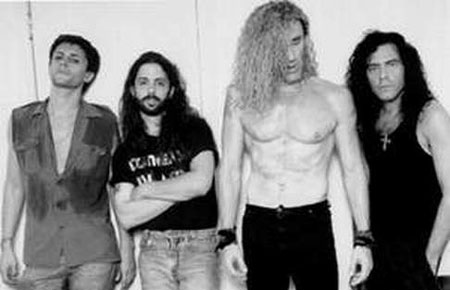
you feel about that album and –from your perspective- is it at the same level of quality with the Widomaker debut?
Marc Russell: I think it’s head and shoulders better than Blood and Bullets. It was made the way rock records should be made. From conception to completion was about a month, 6 weeks maybe. Al Pitrelli had been on the road and seeing other bands live. He had caught Helmet or some other band and as a result had a major song writing epiphany. He was no longer turning up his nose to the harder, less melodic sound. So Al came in with some great riffs and ideas, he was a different guy, so it came together much easier. I had officially quit the band at that point right at the beginning of that recording, but agreed to help make the record and I’m really glad I did. When the record was complete and I liked it so much I began to wonder about my decision to quit but it had been made. I played some live shows to help out and it was incredibly fun. The pressure was off and expectations were gone. I could just be myself. At that point guys like Twiggy Ramirez (Marilyn Manson) and Robin Ffink (NIN) had appeared at shows and were hanging out and I was much more comfortable talking to Robin in the dressing room than the band I was in. Although after reading Manson’s book I was very pleased to have turned down the offer to go hang out in New Orleans where they were making their records. That would not have been good for my health. At that end point however, there is one photograph, taken by Mark Weiss backstage after my official farewell gig, where we actually look like a band. We planned to take it right then when the show finished, sweaty, and tired. It looks right. We’d found an identity. At last.
Rockpages.gr: You co-wrote the song “Circles” and did backing vocals on “Just Business”. Apart from those two contributions, did you write anything else that it didn’t end up on the two albums?
Marc Russell: No, I wasn’t much of a writer. I have written since but the timing was always wrong with those records. Plus I was up against Bernie and Al, two very accomplished guitar-player-song-writer hustlers who knew the value of writing contributions to records. I was not so aware, and I didn’t care so much, I wanted the opportunity to play live and have fun. I wanted to be on the business side by the point of the second Widowmaker album and that opportunity had come up so I took it.
<

